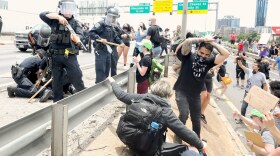The Austin Police Department is facing yet another lawsuit over its use of less-lethal rounds during protests this summer.
A complaint filed on behalf of Steven Arawn accuses an unidentified officer of excessive force for using a so-called beanbag round against him – striking him in the hand and seriously injuring him on May 30.
Arawn, who attended protests against police violence and racism in the wake of George Floyd and Mike Ramos' deaths, was acting as a street medic when he was shot, the complaint alleges. As he was assisting someone who was hit with a beanbag round on the side of I-35, the complaint says, the unnamed officer shot him in the wrist and hand.
Months later, Arawn still hasn't regained full use of his hand, according to the complaint. The lawsuit, filed on behalf of Arawn by Austin attorney Jeff Edwards, is seeking damages for medical expenses.
APD has said it's working with the Office of Police Oversight and the city's Law Department to review each claim of excessive force as it relates to less lethal ammunition.
The complaint also levels allegations of negligence against Austin Police Chief Brian Manley, suggesting he shouldn't have allowed officers to use the rounds in crowds and that the officer involved in the incident has not yet been disciplined.
"[Manley] adopted policies that authorized or tolerated this unreasonable, unnecessary and brutally excessive force even though Manley had long known of the dangers of firing projectiles into crowds, at defenseless persons, and from significant distances," the complaint reads. "Despite this, Austin Police Department policies – and Manley – authorized their use and continued use."
The ammunition, which is fired from a shotgun and contains bags of silica or lead birdshot, is inaccurate at long ranges and – by one manufacturers' own admission – carries the same impact as a .22-caliber bullet.
In the days after both 16-year-old Brad Ayala and 20-year-old Justin Howell sustained brain damage after being shot in the head with the rounds, Manley said the department would no longer use the rounds for crowd control.
Despite that pledge, the department has continued to restock its cache of the munitions, according to an investigation by KUT and The Trace.
The federal lawsuit is one of a handful filed against the department – and one of two filed this week against the department for its use of ammunition marketed as less lethal.
The other was filed on behalf of Sam Kirsch, who was hit in the eye with a less-lethal round on May 30 as well.
Another street medic, Maredith Drake, also filed suit after she was shot in the hand on May 31 while attempting to assist Howell. Anthony Evans, another demonstrator on May 30, is suing the department, claiming an officer who shot him while his hands were raised used excessive force.
The department has suspended seven officers for use-of-force in protest-related incidents on May 30 and 31.
Got a tip? Email Andrew Weber at aweber@kut.org. Follow him on Twitter @England_Weber.
If you found the reporting above valuable, please consider making a donation to support it. Your gift pays for everything you find on KUT.org. Thanks for donating today.






